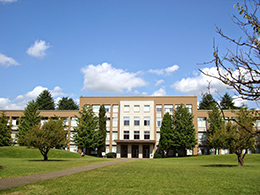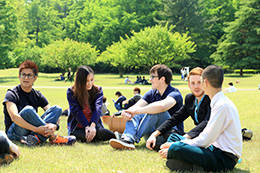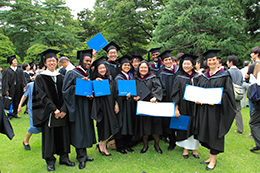JDS中国项目概述大学信息

- URL of Graduate School (English)
- https://www.icu.ac.jp/en/academics/gs/about/index.html
- Name of Course/Program
- Public Policy and Social Research Program
- URL of Course/Program (English)
- https://www.icu.ac.jp/en/academics/gs/ma/
- Degrees
- Master of Arts in Public Economics
- Credit and years needed for graduation
- 30 credits/ 2 years
Features of Graduate School

<Outline of Graduate School of Arts and Sciences>
The International Christian University (ICU) was founded in 1949 with the cooperation of both Japanese and North American educators. The first students entered in 1953 when the College of Liberal Arts was opened. The Graduate School opened in 1957 with a program in education and has since added three more divisions: Public Administration (1963), Comparative Culture (1976), and Natural Sciences (1987). To better prepare for present-day challenges and to strengthen the quality of education, ICU is undergoing a comprehensive reform of our Graduate School. The Graduate School of Arts & Sciences, which integrated the previous four divisions, started offering its programs from April 2010. The Graduate School has removed restrictions between academic disciplines. Students are able to conduct diverse coursework to suit their individual needs and interests. Students are permitted to work with teaching staff in other fields as their thesis advisors. As such, ICU is renowned as the first Liberal Arts College in Japan and ranked as one of TOP 10 Liberal Arts Colleges in Asian countries according to the university ranking by Forbes.
<Small Size of Graduate Programs>
Given the relatively small size of our graduate programs, every student has the advantage of enjoying the full attention of faculty members and not just one academic advisor. To promote hands-on mentoring, ICU faculty have a policy of setting aside at least two hours each week as designated office hours, when students can visit faculty members for any reason without requiring an appointment. Moreover, these college-wide services are available in addition to the regular mentoring and academic advising that graduate students receive related to their courses and thesis progress.
<International Dimension>
Students from many countries study together. Japanese and international colleagues appreciate this intercultural diversity and learn from each other’s differences. Since 2002, ICU Graduate School has accepted about 10 students as ‘Rotary Peace Scholars’ every year. They come from countries all around the world, and, just as JDS students do, they possess working experience and through their graduate studies they aim to prepare themselves for future contributions to peace building, conflict resolution and sustainable development. Bringing together students with such diverse backgrounds and experiences provides even more opportunities for students to learn from each other.
ICU’s international commitment is also reflected in our multi-national faculty. More than 35% of our full-time faculties are non-Japanese from 17 different countries. Many faculty members have work experience in international organizations such as the Asian Development Bank (ADB), the World Bank, JICA and various United Nations (UN) programs and agencies and can supplement their teaching with practical experiences.
<Learning Environment>
ICU is set in a picturesque, serene, wooded campus in suburban Tokyo and its beautiful green campus helps you revive your tired minds and bodies from intensive studies. At the same time, it is located only 20 minutes by public transportation from central Tokyo. Our campus provides a perfect setting for those pursuing graduate studies in the social sciences as one can focus on research in a quiet environment but also readily access downtown Tokyo – Japan’s business center and government seat. It offers easy access to many of the government offices, world leading research institutions, UN agencies, and NGOs/NPOs, as well as opportunities to develop a network among leading scholars and practitioners working in the same field with JDS Fellows.
<Bilingualism>
Bilingual liberal arts instruction in English and Japanese enables ICU students from all over the world to discuss their ideas using a common language. For JDS students who need to strengthen their English language skills, we offer courses of “Academic English” with our well-known English Language Program faculty. JDS fellows who already have a high level of academic English can take advantage of our rigorous Japanese Language Program (JLP). ICU’s English and Japanese Language Programs have both been recognized for their excellence in preparing students to use those languages at a high academic level.
<Basic Policy>
Founded on the principles of Christianity and the Universal Declaration of Human Rights, ICU aims to cultivate ‘Responsible Global Citizens’ who contribute to world peace. Explicit in its name, ICU has been a pioneer in liberal arts education in Japan since its founding in 1953, pursuing international, Christian and academic ideals although winning adherents to the Christian faith is not ICU’s primary. The Graduate School, in accordance with the ideals and purposes of ICU, aims to enable students to master advanced levels of learning in specific fields.
Features of the Course/Program
Objective of the Program:
The Public Policy and Social Research Program does field research in the social sciences including public policy. Relations with other fields are through an interdisciplinary approach. The objective of this program is to nurture future leaders for domestic and international organizations, with training in flexible problem-solving and planning skills.
Overview of the Program:
This program aims to solve academically and practically many problems which the globalizing 21st Century World and Japan are facing. The program consists of five areas of concentration: Politics and International Studies; Social and Cultural Analysis; Media and Language; Public Economics, and Peace Studies. The program respects interdisciplinary research and education, and students of various backgrounds and origins can foster spirit of exploring into frontiers of knowledge by encounters and dialogues with others at ICU.
Features of the Master’s Program:
Expected Outcomes of the program is as follows.
(1) It is expected that by completing the ICU Graduate School’s Public Policy and Social Research Program, students will be able to conduct research and develop a deeper and broader understanding on how to solve issues of utmost importance to China, including foreign policy, regional integration, security related issues, the BRI, Sino-Japan relations, Sino-US-Japan relations, improvement of administrative capabilities, strengthening of administrative systems for regional development, etc.
(2) It is expected that students will be able to develop their capacity to strengthen systems for regional development and policy-making to deepen foreign policy understanding from a global context and administrative capacity in China. In addition, students will be able to obtain a deeper understanding of regional institutions such as ASEAN, ASEAN plus 3, the Comprehensive Progressive Trans Pacific Partnership (CPTPP), the US-Japan Alliance and Japanese foreign policy.
(3) It is expected that students will be able to strengthen their problem-solving abilities in applying theory to practice.
(4) ICU has accepted in the past more than 30 JDS fellows from China. Therefore, graduates of the program would join and strengthen a network of previous JDS fellows in China
Necessary Curriculum to Obtain the Degrees
Courses taught through English language for the 2025 academic year (English Course)
The following describes the structure and outline of the curriculum and the goals of faculty-student advising.
(1) Graduate School-Wide Courses
Through these courses students acquire the necessary knowledge and skills for research in the Graduate School’s master’s program. For example, the course “Writing for Researchers” helps graduate students successfully engage in the research publication requirements of their chosen discipline, including such topics as required content, information ordering and data analysis. Related to it, we also started to offer “Academic English” (For 1st years) and “Academic English for Research” (For 2nd years) specifically for JDS fellows. Each course is enrolled throughout a year. Students can develop not only their writing skill but also reading as an independent reader, discussion and presentation in English for two years. In “Field Research and Professional Learning”, students conduct field research to acquire understanding of research techniques, skills to conduct projects, and negotiation skills; through that experience students conduct self-evaluation and analysis and bring their work together into an academic report.
(2) Foundation Courses
The course “Public Policy and Social Research” provides the fundamental knowledge needed for taking part in the empowerment and improvement of public policy. “Economic Analysis” equip students with statistical mythologies required in economics and business management. According to the need, students are also encouraged to take the course “Research Design and Methodology”, which will enhance their research skills needed for developing their study accurately.
(3) Specialization Courses
Students in the Public Economics Concentration choose either economics or business administration as their field of specialization: Students in economics are required to take core courses in microeconomics, macroeconomics, econometric analysis, and advanced econometrics, while students in business administration choose relevant courses from business administration, accounting, and finance.
(4) Research Guidance
Time for seminars is periodically taken and opportunities are provided for debate and detailed advising with faculty advisors to respond to the needs of each student. These opportunities are used to advise students on their research they are conducting on their individual research topics. In writing their master’s theses, students are advised on areas in which they may lack understanding and other individual advising is given in such areas as the determination of necessary themes and central ideas, an early review of source material, and selecting research methods.
(5) Foundation Courses and Specialization Courses in Related Fields
Courses for both basic and specialized study of related fields make possible the diverse study from various educational perspectives those areas that serve as an asset in resolving the issues that are faced by students’ own countries.
(6) JDS Lecture Series
This lecture series brings in experts to discuss regional international relations issues from a global and regional context. Past lectures include China’s Foreign Policy on the Pacific, China’s Science Diplomacy in the SCS, Soft power and Public Diplomacy, The TPP and Regional integration, Philippines Politics, Sino-US relations etc.
(7) Domestic and international academic conference (s)
Students are strongly encouraged to present their research at domestic and international conferences organized through the JDS program coordinator at ICU. While the conferences may change year by year, in the past JDS students have been able to present their research to peers and senior scholars to receive invaluable feedback. We also feel that these conferences expose students to the highest quality of research and give them an opportunity to network domestic and international. These connections are meant to be leveraged once students return home for professional development and international cooperation.
30 credits are required as a graduation credit. The detail in each course is as follows:
2 credits (1 course) from Graduate School-Wide Courses
4 credits (2 courses) from Program Foundation Courses
8 credits (4 courses) from Specialization Courses for each area of concentration
6 credits of Research Guidance
6 credits (3 courses) from any Foundation or Specialization Courses in Related Field or Research Guidance
4 credits (2 courses) from any Graduate School Courses
Note: ICU has agreements on educational exchange and credit transfer with Institute for the Advanced Study of Sustainability, United Nations University and Tokyo University of Foreign Studies. JDS fellows can take courses in these universities and get credits up to 10 credits.
Note: If you would like to know more about the offered courses and their syllabi, please check the following link too:
https://campus.icu.ac.jp/public/ehandbook/SearchCourseAndSyllabus.aspx?lang=e
*Please select “2024” for Year, “ALL” for Term, and “Public Policy and Social Research” for Major. Then, you can see the list of all courses which are offered in AY2024.
List of Faculty members capable of guiding JDS China Fellows
and their Research Specialities
Upon enrollment each student is assigned to an academic advisor for the purpose of general guidance based on his/her research proposal. By a prescribed date in the third term of the first year, students submit to the dean a tentative title of the thesis with the signature of their advisor.
Academic Schedule
Facilities (ex: Library, PCs, Gymnasium etc.)

(1) Dormitories
ICU has several dormitories for Graduate Students in the Student Life Zone on campus and new dormitories opened in April of 2017. There are some floors which mainly have single rooms to accommodate graduate students and students with diverse needs.
For more details: https://www.icu.ac.jp/en/campuslife/dormitories/
Two New Dormitories: https://www.icu.ac.jp/en/campuslife/dormitories/new2017/
(2) Library
The ICU library, located at the center of the campus, is one of the few open stack libraries in Japan. The library currently maintains the collections such as Books in Japanese, 423,883; Foreign books, 336,948; Journal subscriptions, over 13,700 (including e-journals). Our library is renowned as one of top-ranked libraries for the high number of items checked out per students. In 2000, the new library opened as the first in Japan to operate on an automated book storage/retrieval system. It offers a variety of up-to-date multimedia services, including a study area with Internet connected PC booths, group study rooms, and multimedia rooms.
(3) Sports Facilities
■Physical Education Center / Central Locker Building
There are two gymnasiums on campus. Physical Education Center A, which was completed in 2018, houses the main court , a studio , and seminar rooms in which physical education lectures can be conducted. Physical Education Center B, which was completed in 1972, houses rooms for ball games, martial arts, and weight training. Other physical education facilities include a swimming pool, which was completed at the same time as Physical Education Center A, and the Central Locker Building, which was completed in 2001 and houses locker rooms , shower rooms , offices for faculty in the Physical Education Program, etc. In addition, there are also roofed tennis courts , a baseball field, a soccer/rugby field, an archery range, etc.
(4) Club Activities
ICU has many excellent and international club activities, which are open to ALL students. For example, there are activities for UNESCO, UN, English debate circle, etc. Also, there are numerous cultural club activities, such as modern jazz, classical music, Japanese tea ceremony, Japanese traditional dance, and others.
(5) Counseling: At the Counseling Center, counselors are available to discuss psychological issues with students in English and help them deal with other personal concerns at the university.
(6) Health Services: Consisting of the university physician and nurses who can speak English, the Health Care Office (HCO) is equipped for the health of students, faculty and staff, as well as for campus environmental health conditions and health education programs.
Advice for Graduate School Applicants

ICU has maintained a strong record in accepting more than 30 JDS students from China. As this record indicates, the Public Policy and Social Research Program at ICU offers valuable opportunities for fellows from China to be trained as talented professionals in your own fields.
After two years of study at ICU, JDS Fellows would be able to obtain the degree of Master of Arts in Public Administration, International Relations or Peace Studies according to students’ research interest. ICU is consistently ranked as one of the best universities in Japan, and economics, international relations, development studies, bilingual education, internationalism, and liberal arts education are its particular strengths. We can offer the best curriculum for the learning of development studies, and we take great pride in consistently sending out excellent researchers and professionals to academic institutions, government organizations, and international organizations such as UN, UNESCO, etc. Both our curriculum and faculties’ teaching and advising prepare JDS Fellows for the challenges they will face as future world leaders and policy makers. ICU’s diverse yet close-knit community of students, staffs, and faculties and our tradition of small classes that actively promote open discussion and debate to challenge our JDS scholars while helping them to feel comfortable so they can learn effectively. We are here to facilitate our JDS Fellows in fulfilling their academic, professional and personal goals so they can return to their home countries prepared to fully contribute to the development of the region. To maximize the achievement from this program, we would like to advise the students who are applying to our program to choose a topic of research that is close to the specialization – or especially the current research interest - of one of our faculty.


